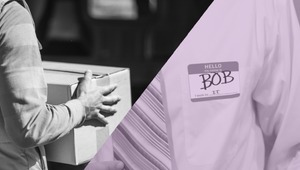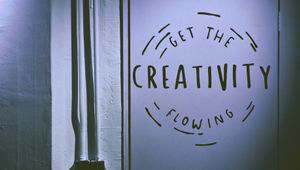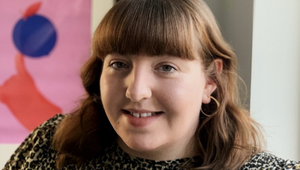
How Iris Is Redefining Talent for this New Age

There’s nothing inherently creative about an agency brand in itself. The world’s most iconic communications businesses aren’t conjured up out of the aether. They’re the sum of the talents and personalities of all the people who work for them.
We’ve all heard about ‘The Great Resignation’ or ‘The Big Quit’, and I’m sorry to say you won’t have heard them for the last time. As it has in so many other areas, COVID-19 has altered the talent market with a jolt, awakening many businesses in the communications industry to the crucial focus on talent they need to be pursuing in order to survive and deliver in 2022 and beyond.
As global ECD and London CCO of Iris, Grant Hunter has been wrestling with ideas of how to find, attract, retain and support the most exciting creative talent for some time. And he’s keen to share what's working, and where the industry needs to do better. LBB’s Alex Reeves spoke to him about all of this and more.
LBB> What are the main ways you’re thinking about talent as a creative agency leader right now?
Grant> There’s widespread conversation around the war on talent and the great resignation. Hybrid working has eroded companies’ cultures. Agencies work when you’re collaborating together and there’s a certain energy in the creative process that can only happen when you’re IRL. We have been super flexible and have embraced hybrid working. Our culture is very important, when there’s a buzz in the agency you feed off it. But it is a balance we currently encourage two days in three days from home.
When it comes to talent, we need to really redefine how we attract new talent - creative problem solvers who will bring fresh perspectives so our output is refreshed. This is an industry-wide issue. We have to redefine what the creative company of the future looks like and make it attractive to the next generation. We need to open people’s eyes to what we can help create. For too long we’ve created a desire for more, more, more. We now need to use our creativity to make a circular economy look desirable.
Retention is then key and that means truly investing, being flexible and creating space and pathways for people. We have been very successful at growing our own through nurturing a collaborative creative environment where ego is parked at the door. And we’ve also been really open to people moving disciplines. I think new talent might not necessarily know what role within the agency is going to be right for them so the opportunity to try different roles in your first year is a great way of helping people find their path. It is also beneficial to the agency from an empathy perspective as they gain a greater understanding of how the wider business operates.
Someone like Eli Vasiliou, who started in account management and then moved into copywriting and has now become the CD on Starbucks. Eli’s a real talent with immense drive and proactivity. She led the ‘What's Your Name’ campaign around the trans lived experience of being deadnamed. I think that she is a real success story, seeing someone with talent and not being closed to them moving to a different specialism.
We've just done a similar kind of thing with Andrew, who started in production. He has a real gift for writing. He was enjoying production but felt like he had more to give. So we've given him the opportunity to be a content writer and he's smashing it. People are requesting him all the time because he brings this fresh energy and perspective. So there's definitely a thing they're around investing in and being open to people within the agency.
LBB> What do you think are the most important ways you’re approaching new talent coming into the agency?
Grant>I think the agency has to evolve beyond traditional art director copywriter partnerships. We are open to more flexible models where we formulate the right mix of skills for the problem we’re creatively trying to solve.
When I look at the work we're doing with the Brixton Finishing School, or with D&AD Shift, we're trying to find people who haven't necessarily come through that monoculture of the advertising and creative schools - trying to promote different perspectives. This is super important.
We're looking at how people are playing with platforms like TikTok, which is nurturing a new breed of creators. A couple of creators we partnered with through Pops - our production studio - are creators that cut their teeth on TikTok. They're used to that format - shooting vertical, picking up a camera shooting quickly, and then moving on. I think we're seeing more of that from our clients as well. People want that nimble, agile approach. But the creative idea still has to be on point.
LBB> I can totally see why an agency like you and your clients will benefit from having that kind of talent accessible to you. But what's the key to getting those people to adjust to working for a brand client, instead of just being creators for themselves?
Grant> As an agency you have to be more flexible. You can't be in that traditional structure. On bigger projects, of course, we still use traditional production partners, but we have to be the conduit, the interface if you like. We almost become the client in many instances there because we know what the brand stands for and we help guide those creator makers.
Also, just letting them go. There's a piece we've just created for adidas which is reactive. Anthony, the creator we’ve partnered with, has been playing around with different filmic techniques. He’s a physics graduate, a real tech-head who's now found his passion within film. We had this idea about creating an endless piece of footage to celebrate Pedri winning the Golden Boy award for best young player of 2021. Pedri played 73 games last season across multiple tournaments, he’s a phenomenal engine. Anthony developed this interesting film technique which he’s been experimenting with and it works so well with our never-ending concept particularly when it’s in a reel on Insta. The loop is mesmerising and it’s adidas football’s most viewed reel to date.
LBB> You mentioned D&AD New Blood Shift and Brixton Finishing School. How are you broadening your recruitment so that you're bringing in more diverse voices?
Grant: Agencies can default due to the pressure of ever-shrinking deadlines, to young talent who are already programmed to deliver and can hit the ground running. You've got to take a pragmatic and longer-term approach with it and try to get people plugged into projects with the safety of experience around them so they actually learn. You have to be prepared that maybe nine times out of ten it might be off the mark, but that one time out of ten it'll be complete genius. You've got to be patient and invest in that.
We're looking at our young talent programme for next year at the moment and looking at the way we nurture new creative problem solvers. We think a big problem facing our industry is attracting people who are questioning advertising’s purpose. We think leading the debate on brands that have a passionate purpose geared around people and the planet are the ones that will flourish as we move to a circular economy and a society that's fairer to all. By showing how they can be part of and lead the change is key.
We started a creative hub called The Bunker back during my first tenure at Iris London. That whole notion was to create a separate agency if you like, of young makers to whom we could set a number of briefs and see a fresher output come out of it.
We partnered with Brixton Finishing School, and we’ve been long term supporters of D&AD Shift, we also have a partnership with Falmouth University - more of a traditional course. We're helping them all and putting briefs in on a regular basis so they get to work on live opportunities.
With Brixton, it's a wider pool of talented people who want to get into different parts of the agency - not just creative but planning or producing. And to some of those, it's opening their eyes to our world. Maybe you want to get into music or you want to get into writing, but actually, there's a career over here for you. That's something for the advertising and creative industries in general - how do you make it exciting again? Because when I was at art school it was a really compelling career. It's almost under fire now. There's more competition. But I still think our strength is that you can work on multiple sectors with different passion points in different markets. By being in one place, you get that wider exposure, whereas if you go to an in-house department, for example, or into one of the tech players, it's maybe not quite as varied. That's one of the strengths of the agency/collective model.
I think the hardest thing for some people is not knowing what they don't know. So it's opening people's eyes to the possibilities of our industry. Open up the doors and give people a taste of it. And I think that's what we need to do as a wider industry.
Go after people who have a clear passion in an area, their creativity might be a bit raw but it’s down to us to help mentor them and show them a path. So, if you're into football, did you know you could be creating content on adidas football’s channel reacting to the latest game? Or if you're into a certain sub genre of music, realising there’s a world of experiential activation where you can use your knowledge to create new experiences.
LBB> Being more open minded about how people’s goals might change and their strengths might be better played elsewhere. How do you allow for that flexibility?
Grant> It just comes from your general mindset and the way you set up the agency to start with. Going back right to the early days, Sean Reynolds, one of the founders, used to describe the creative department at Iris as 'creative soup'. He didn't come from a traditional ad agency. He just put interesting people together. So back then we weren't even art director-copywriter teams, really. There'd be someone who maybe had done some graphic design for a music label and you'd put them with someone who's done an English degree and then you see what happens. I think that's always been at the heart of what we've done. And sometimes people come in as single, hybrid creators and we're open to that. So I think it's just being open to it.
In terms of where you find the talent, you have to work hard to attract it. You have to do it through the work you've got but then also the places and spaces you hang out in. We're going to put a big focus on TikTok as a platform because it is a format where there’s a wealth of talent out there who are already playing with it in interesting ways.
One partnership I was talking to the other day, they have their own DIY renovation channel. They've bought a house and done it up themselves, turned that into a channel and used it to get deals with its brand partners. That's quite savvy. They're a young creative team who happen to have that love of motion and use TikTok for that. It's really entrepreneurial. We often talk about creative entrepreneurs. They're the people who spot opportunity and get stuck in.
LBB> It’s interesting that you’re singling out TikTok as the place where you’re sourcing creators. Why is it special and what about other platforms?
Grant> We were looking at some work with Samsung a few years ago called the Era of Live and that’s when we really first started looking at TikTok – we were like, “What’s this platform from Asia, what's going on with it?” We got lost down a number of wormholes to start with because of the creativity on show. But this notion of live was the exciting thing about it. Live video is almost like the new selfie. The selfie in static is long gone. It's now the era of video and I suppose TikTok captured that. Our research for the Era of Live said that 94% of mobile phone use is now vertical.
The Samsung Vertical Gig we did with Mabel was a reaction to the fact that 9:16 as a format challenges creativity. For me, I'm so used to the cinematic widescreen format but actually as soon as you flip stuff around that vertical format becomes interesting in itself.
But don’t get me wrong, it's not just TikTok. Becky - who's one half of Han & Becks - has thousands of followers on her YouTube channel where she talks about plus-size fashion. She really built that in lockdown, gave it a go and again has got brand partners on board. It’s another example of being open to the possibilities.
LBB> You mentioned the shapes of creative teams and how from the start, Iris has always been open minded in terms of putting different types of creative people together. What other kinds of talents do you like to throw in the mix?
Grant> Part of our offering is ‘Future Strategy’, where our strategists are going further up the chain and taking a longer-term and more holistic approach. We look for the barriers to participation. What’s stopping people getting involved with you as a brand? We believe the best brands are participation brands. There are five levers to participation and our PBI shows that if you leverage those levers as a brand you will be more successful and build deeper relationships with people. Participation means getting involved with the market and getting the market to do the marketing. If you take the Starbucks work, by working with Mermaids and the transgender community, that ensured the work was 100% authentic. We uncovered an insight about trans guys in the US talking about how they had tried out their chosen name in Starbucks to see how it felt. It connected a distinctive brand asset – the name on the cup - to a personal moment of connection. In that process we worked closely with the trans community. We had a duty of care with that particular piece of work to make sure that it connected and was totally authentic. Nick Jack Davies from the Sweetshop was brilliant on the direction, but having the client part of that process as well and the fact that they committed to funding the Mermaids Charity (they support trans teens and their families) helpline for 18 months.
We also have our motion and editor-director specialists through Pops. So instead of us writing the script then getting a production company to pitch, we have them as part of that process. We’re working with the director/animators hand-in-hand. Again, I think that makes it a more interesting, collaborative process and one which is better for a partner because there's no real division between production company and agency.
LBB> It's different in every country of course, but has the experience of lockdown changed the way that you consider recruiting? For example how not everyone has to be in the big hub cities necessarily.
Grant> Yeah, totally. I think it's made our US offices a lot tighter and linked together. New York and Atlanta have a really close working relationship now. We're moving Matt, one of our CDs from London, out to San Francisco, because we're doing lots of work around fintech.
We hired another CD, Danielle. She's based in Milwaukee and Matt’s in London now, and the office and all the rest of the guys are in San Francisco and we've been running like that for the last eight months. It extends the working day a bit because Matt gets to do some stuff in the morning, then Danielle will wake up, they'll have perhaps four hours, five hours together then Matt will sign off and Danielle sees it through. It's worked. They're dying to get out there to San Fran and be there all together, but it's definitely worked. The business is growing and they're creating some interesting work.
LBB> It seems like the geographic barriers to entry into the industry could break down a bit. How do you see your role in that transition?
Grant> It falls on us. We need to get that message out. I was on a call earlier and one of our producers is up in Manchester at the moment. There are people down in Cornwall, people in Spain and Portugal over the lockdown periods. It has worked. I think the big thing is changing the mindset of many people who are more traditional or stuck in their ways, showing that there is a way to make hybrid working work. I think it could be really beneficial to people who couldn't afford to get down to London. So hopefully it does democratise and open up the talent pool.















